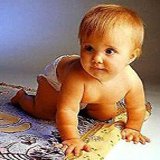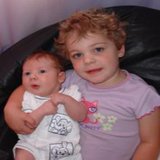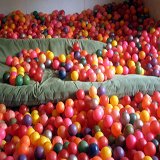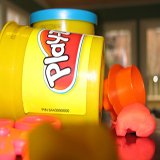Stimulating Child Social Development - 22 Month Old to 24 Month Old
During the child social development phase of 22 - 24 months, your child becomes more sociable. However, this doesn't mean that his psychosocial development is optimal, because many of his contacts with other children still end up in tears - usually due to squabbles over toys.
He may be shy with strangers and may greet relatives he hasn't seen for a while with a blank silence. Feeding himself is a great self esteem concept activity (although he still makes a mess) and he may well be reliable clean and dry during the day.
Child Social Development
22 - 24 month old
Suitable suggestions for Child Social Development
(22 Month Old - 24 Month Old)
Temper Tantrum
People talk of the "terrible twos" when referring to toddler tantrums because it is associated with difficult and challenging behavior.
And there's no doubt that there is an element of truth in this observation. For example, dealing with temper tantrums in the middle of a supermarket checkout queue (because he demands a bar of chocolate that is temptingly stacked where he can see it) is extremely embarrassing.
He may seem completely unreasonable at times. Living with a tempestuous 2-year-old test the patience of the calmest parent...!!!
... but try to maintain a positive perspective no matter how despairing you may feel at times with his behavior.
Reassure yourself that toddler temper tantrums, is actually normal for his emotional intelligence development level.
This does not mean you are an inadequate parent or that you are doing anything wrong. Of course, cultivating this attitude won't have any direct effect on your 2-year-old's behavior, but it may help you feel better about yourself.
Make an effort to look for the more endearing qualities of your growing child, such as his sense of humor, his caring personality and his never-ending curiosity. This helps you maintain a balanced outlook on parenthood.
Post Potty Stage
At this age your child probably has good bowel and bladder control during the day, and he is pleased that he now wears pants "like a big boy". He still needs lots of praise and encouragement for his successes with the potty.
Always remember to give plenty of reassurance when he occasionally wets himself accidentally. His bowel and bladder control will be improving self confidence.
Friendship
Friendships start to play a more important role in his life now. He enjoys being with other children and you may find that he becomes bored and moody when he spends too much time on his own.
On the other hand, don't be surprised to find that he and his friends fight frequently, though do your best to sort out any squabbles.
Luckily, at this age, children quickly forget earlier disagreements. Try to make arrangements so that he has someone of his own age to play with most days.
Be sure to visit all the child social development pages for different ages.
Read more about the different stages of social development.
Top Tips for Child Social Development
(22 Month Old - 24 Month Old)
- Let your child see that you value his achievements
- Encourage him to think of others
- Give him small tasks of responsibility
- Teach him how to make turns
- Make time for yourself each day
His self-confidence depends greatly on how he thinks you view him - he needs to feel valued by you. He feels good about himself when you praise him and give him your attention.
He will become more sensitive to the feelings of other people if you specifically suggest this to him. Ask your child about the children he mixes with and to think of the games they could play.
Even at this age, you can tell him that he's in charge of putting his toys into the toy box. Small amounts of responsibility like this increase his maturity and level of independence.
This very important social skill training you can practice with him at home. Let him experience waiting to have a drink until you have had one, or letting his sister speak before him.
You need to spend time just for you alone. I remember feeling more able to deal with my 2-year-old's fluctuating behavior when I also had time for myself, just to put my feet up.
Top Toys for a 22 Month Old - 24 Month Old
- dressing-up clothes
- books with pictures
- large baby play mat
- construction toys
- stacking toys
- inset boards
- picture cards
Be sure to browse through all the child social development pages that is broken down in different age groups.
Find It!
Can't remember where you read something specific? Just type in your search term in the box below and your specific topic will be returned to you instantly.









